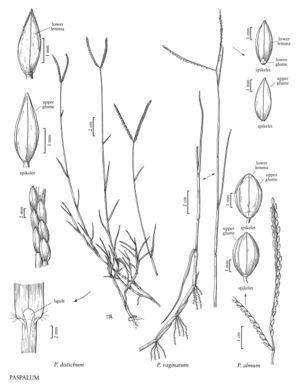Difference between revisions of "Paspalum vaginatum"
FNA>Volume Importer |
FNA>Volume Importer |
||
| Line 17: | Line 17: | ||
-->{{Treatment/Body | -->{{Treatment/Body | ||
|distribution=Puerto Rico;Miss.;Tex.;La.;Virgin Islands;Calif.;N.C.;Pacific Islands (Hawaii);Ga.;S.C.;Ala.;Fla. | |distribution=Puerto Rico;Miss.;Tex.;La.;Virgin Islands;Calif.;N.C.;Pacific Islands (Hawaii);Ga.;S.C.;Ala.;Fla. | ||
| − | |discussion=<p>Paspalum vaginatum grows in brackish and salt marshes. It is native to warm, coastal regions around the world, including the Americas. It has been grown for turf and in lawn trials, but is not yet widely used for these purposes.</p> | + | |discussion=<p><i>Paspalum vaginatum</i> grows in brackish and salt marshes. It is native to warm, coastal regions around the world, including the Americas. It has been grown for turf and in lawn trials, but is not yet widely used for these purposes.</p> |
|tables= | |tables= | ||
|references= | |references= | ||
| Line 26: | Line 26: | ||
-->{{#Taxon: | -->{{#Taxon: | ||
name=Paspalum vaginatum | name=Paspalum vaginatum | ||
| − | |||
|authority=Sw. | |authority=Sw. | ||
|rank=species | |rank=species | ||
| Line 33: | Line 32: | ||
|basionyms= | |basionyms= | ||
|family=Poaceae | |family=Poaceae | ||
| − | |illustrator=Linda A. Vorobik | + | |illustrator=Linda A. Vorobik;Cindy Roché |
| + | |illustration copyright=Utah State University | ||
|distribution=Puerto Rico;Miss.;Tex.;La.;Virgin Islands;Calif.;N.C.;Pacific Islands (Hawaii);Ga.;S.C.;Ala.;Fla. | |distribution=Puerto Rico;Miss.;Tex.;La.;Virgin Islands;Calif.;N.C.;Pacific Islands (Hawaii);Ga.;S.C.;Ala.;Fla. | ||
|reference=None | |reference=None | ||
| Line 39: | Line 39: | ||
|publication year= | |publication year= | ||
|special status= | |special status= | ||
| − | |source xml=https:// | + | |source xml=https://jpend@bitbucket.org/aafc-mbb/fna-data-curation.git/src/f50eec43f223ca0e34566be0b046453a0960e173/coarse_grained_fna_xml/V25/V25_1449.xml |
|subfamily=Poaceae subfam. Panicoideae | |subfamily=Poaceae subfam. Panicoideae | ||
|tribe=Poaceae tribe Paniceae | |tribe=Poaceae tribe Paniceae | ||
Revision as of 20:33, 16 December 2019
Plants perennial; rhizomatous and/or stoloniferous. Culms 10-79 cm, erect; nodes glabrous. Sheaths glabrous, sparsely long pubescent distally; ligules 1-2 mm; blades 10-19 cm long, 1.4-8 mm wide, flat or conduplicate, glabrous or pubescent, apices involute. Panicles terminal, usually composed of a digitate pair of branches, a third branch sometimes present below; branches 1.1-7.9 cm, diverging to erect; branch axes 0.4-1.4 mm wide, winged, glabrous, margins scabrous, terminating in a spikelet. Spikelets 3-4.5 mm long, 1.1-2 mm wide, solitary, appressed to the branch axes, elliptic-lanceolate, glabrous, light stramineous, apices acute to acuminate. Lower glumes absent (rarely present); upper glumes and lower lemmas glabrous, 3-veined; upper florets white. Caryopses 2.8-3.1 mm, yellow. 2n = 20, 40, 60.
Distribution
Puerto Rico, Miss., Tex., La., Virgin Islands, Calif., N.C., Pacific Islands (Hawaii), Ga., S.C., Ala., Fla.
Discussion
Paspalum vaginatum grows in brackish and salt marshes. It is native to warm, coastal regions around the world, including the Americas. It has been grown for turf and in lawn trials, but is not yet widely used for these purposes.
Selected References
None.
